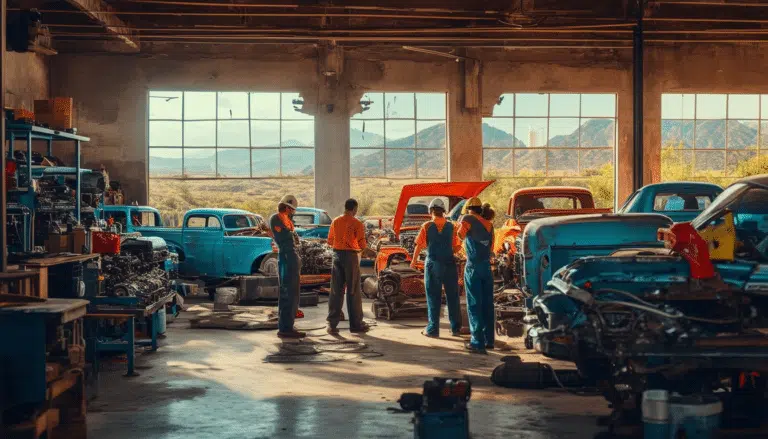The average vehicle in Spain is over 14 years old and has accumulated 166,000 kilometers, which entails significant risks.
In Spain, the automotive fleet is aging at an alarming rate, with the average vehicle surpassing 14 years and reaching a mileage of 166,000 kilometers. This situation becomes a cause for concern due to the associated risks it involves. As vehicles age, the likelihood of mechanical failures increases, thus compromising safety on the roads. Furthermore, accumulated wear and tear can lead to higher maintenance and repair costs, placing an additional burden on owners.
The Spanish automotive fleet is characterized by high age and elevated mileage. With an average car over 14 years old and 166,000 kilometers, the risks associated with this reality are palpable. Factors such as previous accidents, inadequate maintenance, and inconsistent mileages endanger the road safety of the country. This article investigates the current state of vehicles in Spain and emphasizes the importance of renewing the automotive fleet and the proper maintenance of cars.
The Age of the Spanish Automotive Fleet
The analysis of the Spanish automotive fleet reveals that the average car is over 14 years old and has 166,000 kilometers, figures that illustrate an alarming phenomenon of vehicle aging. Although the sale of new cars has increased, it has not been sufficient to counteract the high average age of the automotive fleet. A recent study estimates that there are 25.6 million cars in circulation in the country, of which only 13% are less than three years old.
Regional Variation in Mileage
There are significant disparities in average mileage by autonomous community. Regions such as Galicia, Extremadura, and Castilla-La Mancha stand out with figures exceeding 183,000 kilometers, while the Balearic Islands and Catalonia present lower values, at 139,000 and 145,000 kilometers respectively. This regional variation reflects economic and social differences that affect the automotive fleet in different areas of Spain.
Safety Risks Associated with an Aged Fleet
The high mileage and age of vehicles in Spain place many cars in a state where they can pose significant risks to road safety. According to a report, 18% of vehicles may have defects that compromise their safety, including previous damage, inconsistent mileages, or history of being rental vehicles. This percentage translates to approximately 4.6 million potentially unsafe vehicles on Spanish roads.
Autonomous Communities with the Highest Risk Percentage
The Canary Islands and the Balearic Islands stand out as the communities with the highest percentage of vehicles in a risky situation, with 30% and 29% respectively. This occurs despite the average age of their vehicles being 12 years, reflecting that beyond age, other factors influence vehicle safety.
The Rise of the Second-Hand Market
Given the economic difficulties, the market for second-hand vehicles is continuously growing. More than half of the cars in circulation have had multiple owners, a phenomenon that adds complexity to monitoring the technical condition and regular maintenance of these vehicles. This market is dominated by imports, which represent 6% of the total with concerning figures of age and mileage, with 55% exceeding 15 years and an average of 195,000 kilometers.
To learn how advanced technologies like Mazda’s innovative Skyactiv-Z engine are revolutionizing the electric vehicle market, click here.
The Importance of Proper Maintenance
Regular and proper maintenance of older vehicles is key to mitigating safety risks. Timely maintenance can prolong the life of a car and ensure that it remains safe to drive. However, many owners neglect essential inspections, which increases the likelihood of mechanical failures on the road and contributes to a rise in accidents.
Delve into the effects of maintenance on fuel economy in hybrid vehicles by reading more here.
The Path Towards Necessary Renewal
To improve road safety and modernize the Spanish automotive fleet, a gradual but effective renewal is necessary. Policies must focus on incentivizing the acquisition of new and efficient cars, while also promoting the use of electric and sustainable vehicles. Additionally, there is a need for awareness campaigns to educate drivers about the importance of preventive maintenance and how it can save costs and save lives. With appropriate programs, Spain can significantly reduce the average age of its automotive fleet and the associated risks.
Reflections on the Aging of the Automotive Fleet in Spain
The aging of the automotive fleet in Spain poses a series of challenges that cannot be ignored. With an average age exceeding 14 years and an average mileage of 166,000 kilometers, the risk of mechanical failures and road safety is a growing concern. These older vehicles may lack the modern safety measures that newer cars typically have, increasing the potential for incidents and accidents.
Additionally, the age and high mileage suggest an urgent need for constant maintenance. Drivers must be aware of the importance of periodic inspections to ensure that vehicles remain in optimal condition. However, the cost associated with ongoing maintenance can be an obstacle for some owners, potentially leading to neglect of essential repair needs. This not only jeopardizes the safety of the driver and other road users but can also have negative environmental implications due to the emission of polluting gases.
On the other hand, the automotive industry must consider incentives for the renewal of the vehicle fleet. Government initiatives and subsidy programs could facilitate the transition to newer and more efficient vehicles, including those that integrate sustainable technologies. By prioritizing safety and efficiency, the quality of life for users can improve and foster a culture of environmental responsibility.
In summary, the current situation of the Spanish automotive fleet requires urgent attention and a combination of efforts from drivers, the automotive industry, and authorities. Taking measures to renew the vehicle fleet and ensure proper maintenance of the cars in circulation will be crucial to mitigating the associated risks and promoting safe and sustainable mobility.




